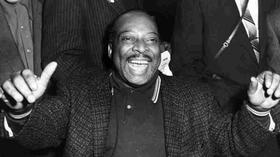Stories of Standards: “One O’Clock Jump”
Tune in to Jazz with Victor Cooper – weekdays from 6-9 a.m. MT – for Stories of Standards to hear our favorite versions of this song all week long!
Stories of Standards is sponsored by ListenUp – If you love music, you’ll love ListenUp.
“One O’Clock Jump” (1938) began as a 12-bar blues arranged by Count Basie and Buster Smith (alto saxophone), based on a Fats Waller tune “Six or Seven Times”. The band was playing at the Reno, a bar with the advantage of being one of four experimental high-fidelity radio stations in the United States, with an exceptionally large reception area. The music was broadcast live; the radio announcer asked for the title, decided he couldn’t use “Blue Balls” on the air and suggested a new title. It was almost one a.m.; he came up with “One O’Clock Jump”, which has been used ever since. This unfortunately unnamed announcer also was the first to use the name “Count Basie” instead of “Bill Basie”. Basie adopted “One O’Clock Jump” as his theme song and closed the band’s first recorded radio performance with the tune. They recorded “One O’clock Jump” on their first recording session for Decca Records on January 21, 1937, an immediate hit for Basie and the first for the group following their arrival in New York City. Benny Goodman played “One O’Clock Jump” in his 1938 concert at Carnegie Hall and it was the last song ever recorded by Earl “Fatha” Hines in 1981. The Library of Congress in 2005 included “One O’Clock Jump” in the National Recording Registry.
Count Basie (William Alllen Basie) (1904 – 1984) joined a vaudeville troupe which disbanded in Kansas City in 1927, leaving him stranded. He played with Walter Page’s Blue Devils from 1928 through 1929, then joined Bennie Moten’s band. After Moten’s unexpected death in 1935 Basie soloed for a while, then formed the Barons of Rhythm, a 9-piece band which included many former members of the Moten band. In 1936 John Hammond (record producer, civil rights activist, music critic and talent scout), was in Chicago with only one radio station available, where he heard Count Basie for the first time. Hammond immediately began writing about the band in Down Beat and other journals, advising everyone to tune in to the little band broadcasting from Kansas City. Basie led jazz bands from 1935 until his death in 1984, with few interruptions.

9(MDA3NDU1Nzc2MDEzMDUxMzY3MzAwNWEzYQ004))
Become a Member
Join the growing family of people who believe that music is essential to our community. Your donation supports the work we do, the programs you count on, and the events you enjoy.
Download the App
Download KUVO's FREE app today! The KUVO Public Radio App allows you to take KUVO's music and news with you anywhere, anytime!